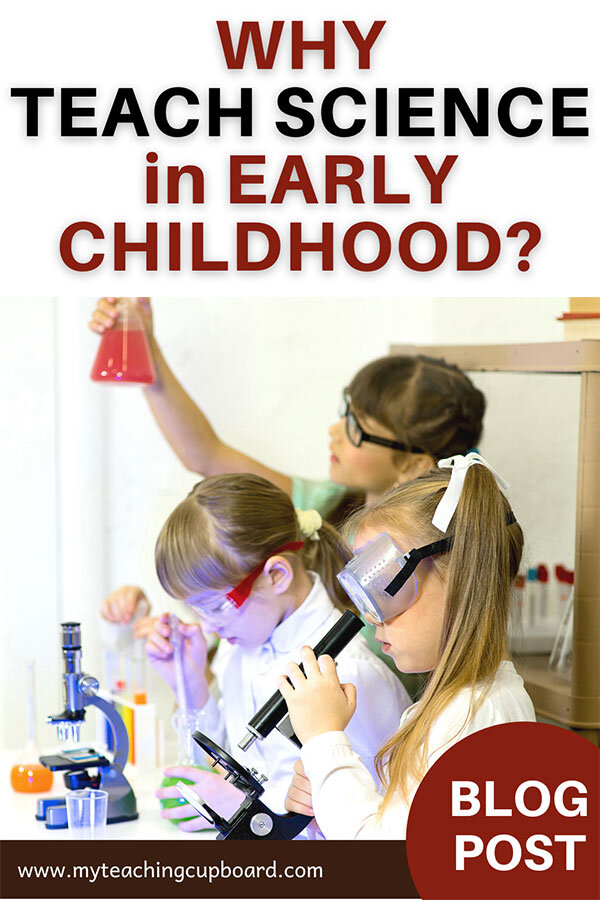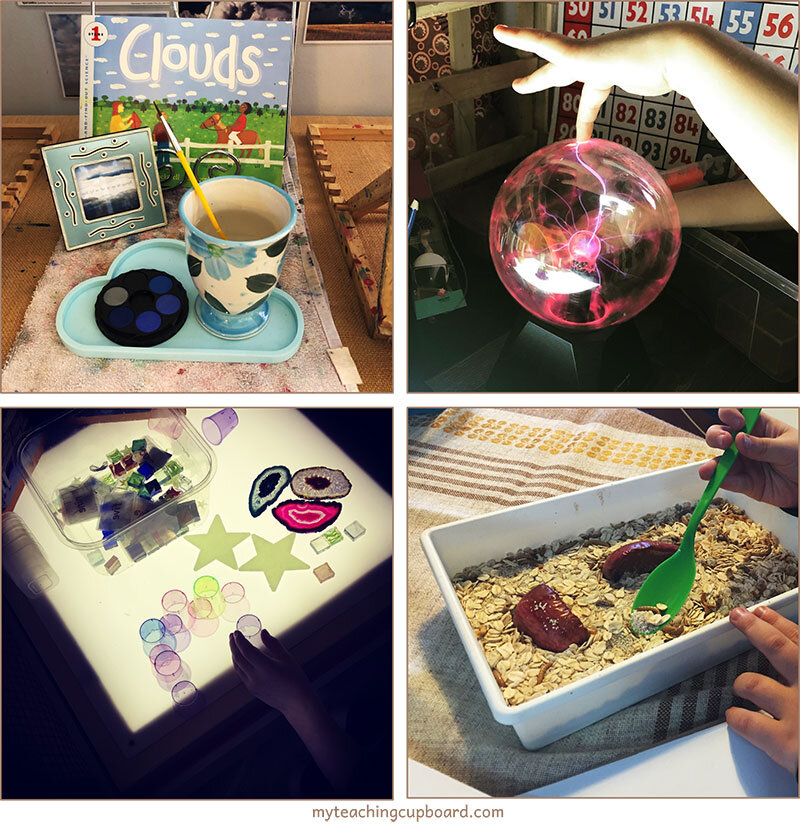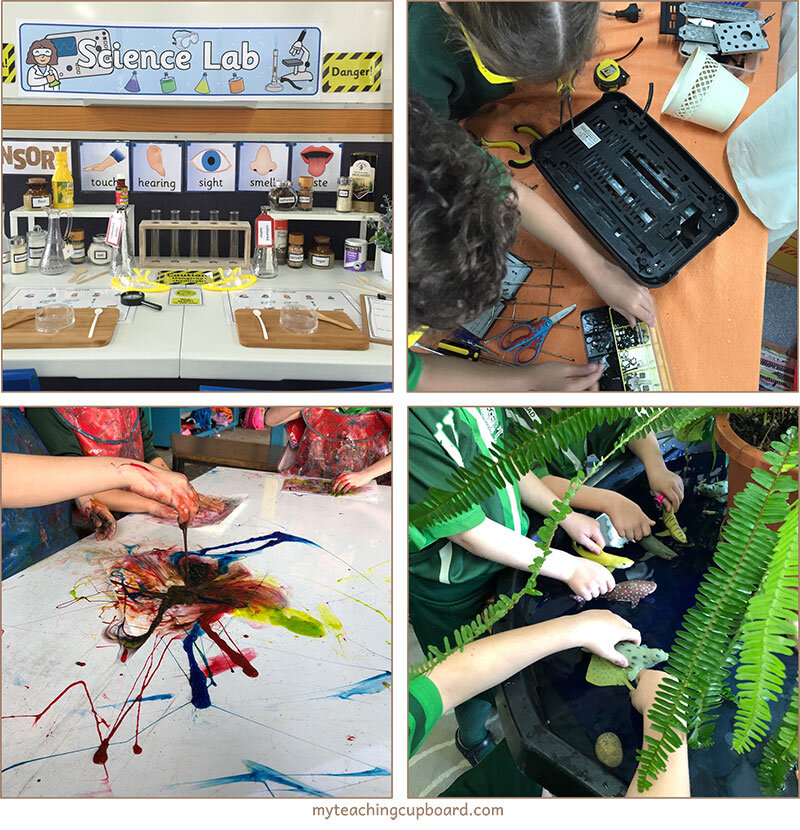Why Teach Science in Early Childhood
Do you feel Science is just one more thing to add on to your already crammed early childhood curriculum? Are you thinking “Why Teach Science in Early Childhood?” Many early childhood teachers feel the same way and are asking themselves the same question. They don’t see the point of including early childhood science education in their planning and feel the focus should be on Numeracy and Literacy only.
I don’t agree. In fact, you are probably already teaching Science if you are implementing an age-appropriate pedagogy. Science is everywhere. You cannot help but teach it.
Your children have come to school with science concepts already established. They have developed scientific knowledge and skills through their experiences as babies and toddlers because Science is how we learn about our world.
This blog post will explain the importance and value of science in early childhood education and show you how you are probably already teaching it in your early years classroom.
Science Feeds the Natural Curiosity of Young Children
Young children are naturally curious. If you are an early childhood teacher, you have no doubt been bombarded with numerous questions from your children about how things work and why things happen. Our young learners are naturally inquisitive about the world around them.
This natural curiosity is what drives them to explore and investigate. It is the reason they learn anything at all. As educators, we should be taking advantage of their inquisitive nature and using it to nurture their enthusiasm for scientific discovery.
Science is an extension of their everyday world. Science encourages and teaches children how to discover and wonder about everything in the world around them. Scientific thinking and the desire to explore and investigate can be used to your advantage in the classroom.
You can use children’s natural curiosity to teach any one of your curricula learning intentions. Setting up investigative play spaces where children can experiment and explore curriculum concepts, where they can practice and learn necessary skills is the key to any successful early childhood learning environment.
It is so important to have children learning about science in your early years classroom as the benefits are numerous.
Science Creates Engaged Learners
If you are already implementing and age-appropriate play-based pedagogy, you will know how engaging this style of teaching is. It’s engaging because you are building on the children’s interests and providing a learning environment which encourages curiosity and exploration.
After all, that’s exactly what scientific skills are – exploration and inquiry. When you harness these scientific skills to build on your children’s interests and present the curriculum through an investigative pedagogy, you will be supporting their learning and development and creating engaged learners.
A play-based pedagogy, if presented correctly, can have your children easily reaching the mandated curriculum benchmarks in Literacy and Numeracy and so many other subjects like Art, History, Geography, Science and Technology. Your children will easily reach these benchmarks when you use their innate scientific inquiry skills in a highly engaging pedagogy.
Science Teaches Literacy and Numeracy Skills Authentically
Authentic literacy and numeracy are embedded in all curriculum subjects which require children to communicate and record their learning. Science is the perfect subject to include in your curriculum if you are looking to teach literacy and numeracy in an authentic way.
The research-based Primary Connections (Australian Academy of Science, 2018) program recognises that science and literacy can be easily integrated and that this integration benefits young students to develop both their science and literacy skills in an inquiry-based program.
Teaching literacy and numeracy authentically will demonstrate to your children the necessity of becoming literate. If you expect your children to record and share their learning experiences, they will need to master literacy and numeracy skills. Every time a child records a learning experience or shares their learning with their peers, they will be practicing essential literacy and numeracy skills.
Science is a subject which involves a lot of communication with others. Whenever you teach a science lesson, your children will need to talk and listen to others. These discussions will help them to expand their vocabulary by using relevant scientific terms and language.
The Early Childhood Science Curriculum will provide many opportunities for your children to develop and revise language and mathematical skills. As children experiment and discuss what they are doing and what they have discovered they will naturally extend their oral language. When your children are required to experiment and record their investigations, they will practice measurement skills in Maths and writing skills in Literacy.
Science Gives Children an Understanding of Their World
The whole purpose of early years science is to give children an understanding of the world they live in. If you would like to learn how to easily (and I do mean EASILY) cover the ACARA Science curriculum in only 40 minutes a week, you might be interested in this blog post: Teaching Science in Early Childhood. It explains HOW to teach the early childhood science curriculum and WHAT the ACARA Science curriculum entails.
The Australian Science Curriculum has three interrelated strands: science understanding, science as a human endeavour, and science inquiry skills.
Science Understanding
The science understanding strand includes Biology, Chemistry, Physics and Earth and Space. As your children learn about the facts and concepts established by scientists, they will develop their Science understanding. They will learn more about the world they live in as they use their science knowledge to explain and predict phenomena and apply their knowledge to new situations.
developing inquiry skills in early childhood science
Science as a human endeavour
Children will discover science as a human endeavour whenever they observe, ask questions about, or describe the changes in the objects and events of their world. They will also begin to understand the influence science has in their world when they notice how they use science in their daily lives. This becomes more obvious if you provide your children with opportunities to care for their environment and the living things within it.
Science inquiry skills
Science inquiry skills are evident any time you observe children learning through hands-on investigative play. Science inquiry skills involve children identifying and posing questions; planning, conducting, and reflecting on their investigations; processing, analysing, and interpreting evidence; and communicating their findings.
If you foster inquiry skills in your young learners by encouraging them to ask questions and wonder about phenomenon, you will be teaching the essential traits for life as a scientist. By encouraging and directing their natural curiosity, and teaching some basic scientific vocabulary, you can help your children to understand the world around them through Science learning.
Science Helps Children to See Themselves as Learners
Including Science in your early childhood program will help to build the self-esteem of your children and help them to see themselves as capable scientific learners.
Recent research suggests children by the age of 7 have formed either a positive or negative attitude towards science. This attitude will stay with them into adulthood. If you can help your children to see Science as something they can do, they will feel confident in their abilities as a scientist and develop a lifelong love of science.
preschool children learning science through hands-on exploration and play based learning
Remember your children have come to school with science concepts already established. Right from birth, your children have been observing, exploring, asking questions and experimenting. If we can nurture their natural scientific inquiry skills in these important early years of schooling where attitudes are formed, we have the chance to establish a positive approach to science education which will stay with them into their future.
Early childhood educators can have a tremendous positive impact on shaping the attitudes of our future scientists. With the emphasis on encouraging girls into the fields of science and including STEM education in our curriculum, it is really important we take every opportunity we have to include science in early childhood education. Early childhood educators have a greater influence on a child’s potential to seek out a career in science or engineering than any other grade level does.
Science Fosters a Growth Mindset
Every teacher should be promoting a growth mindset with the children in their class. Studies show that students with growth mindsets have much better outcomes than those with fixed mindsets. If you are interested in learning all about what a growth mindset is and how to teach it effectively, you might like to read this blog post: Affirmations & Growth Mindsets for Children.
Part of teaching a growth mindset is allowing children to take risks and helping them understand that their thinking may not always be correct. Science provides us with the opportunity to teach our children to experiment and take risks. You will be helping your children to see that science is not just about learning facts and being right, but it is also about hypothesising and testing and about learning by trying things out.
Taking risks and making mistakes is also so important for teaching our children resilience and perseverance. As your children experiment and learn by trying things out, they will see that failure is acceptable and inevitable. Through scientific experimentation your children will build their resilience skills as they learn to accept failure.
Our children are generally more accepting of mistakes and failure when they start school. Unfortunately, our traditional classrooms soon teach young children that there is one right answer and not getting it is seen as an embarrassing failure. If we can honour and build on the mindset that children start their schooling with – that acceptance of mistakes and failure and foster these characteristics through the experimental play-based nature of science we could build on their growth mindset and their learning confidence.
Science Teaches Life Skills and Higher Order Thinking Skills
As a continuation of the growth mindset skills learnt through teaching Science in Early childhood are the life skills and higher order thinking skills Science can foster in your children.
Social life skills like effective communication skills and the ability to work in a team are life skills future employers will be looking for. Science as a human endeavour lends itself to teaching these life skills.
Many inquiry skills are valued and taught through Science. The Australian Curriculum Science inquiry skills involve children identifying and posing questions; planning, conducting, and reflecting on their investigations; processing, analysing and interpreting evidence; and communicating their findings. All of these skills are life skills and higher order thinking skills.
The benefit of teaching Science in early childhood is that your children will learn these valuable life skills and higher order thinking skills early in their school life. The benefits of having children with reflective reasoning and problem solving skills would surely influence any decision to include Science in early childhood.
If you would like to find out how I teach higher order thinking skills in my early childhood classroom, you might be interested in this blog post: Open-ended Questions Promote Higher Order Thinking. You will discover one of the most valuable gifts you can give a child - allowing them the opportunity to experiment and solve problems. Solving problems develops higher order thinking skills. Children must be given the opportunity to experiment, investigate and solve problems. If you are lucky, they may even fail. Read the post to see how I encourage failure in our classroom.
Do you still feel that Science is just one more thing to add on to your already crammed early childhood curriculum? Are you still wondering “Why Teach Science in Early Childhood?“ Hopefully you can now see the many benefits Science has in the early childhood curriculum. Yes, the focus should still be on Numeracy and Literacy, but children need Science in their lives and it should be integrated into your school day whenever possible.
If you are implementing an age-appropriate play-based pedagogy where children are given opportunities to investigate and explore, then you are already giving your children the opportunity to practice their scientific inquiry skills.
Science experiences are very important in early childhood and a valuable addition to the early years curriculum. If you are still hesitant to devote any time to Science exploration in your classroom, please consider looking at this blog post: Teaching Science in Early Childhood. It will show you how to teach not only the Science curriculum but ALL the curriculum subjects and how to cover ALL the learning intentions AND have your children reaching the curriculum benchmarks easily. In fact, you will see how they can learn so much more than just the mandated curriculum.
If you like this blog post on why you should teach Science in your early childhood classroom, please consider sharing it...
Just CLICK the sharing box below.👇











